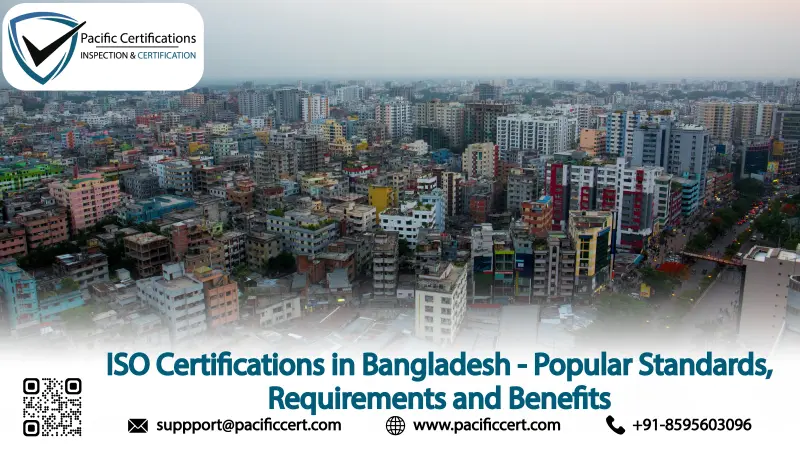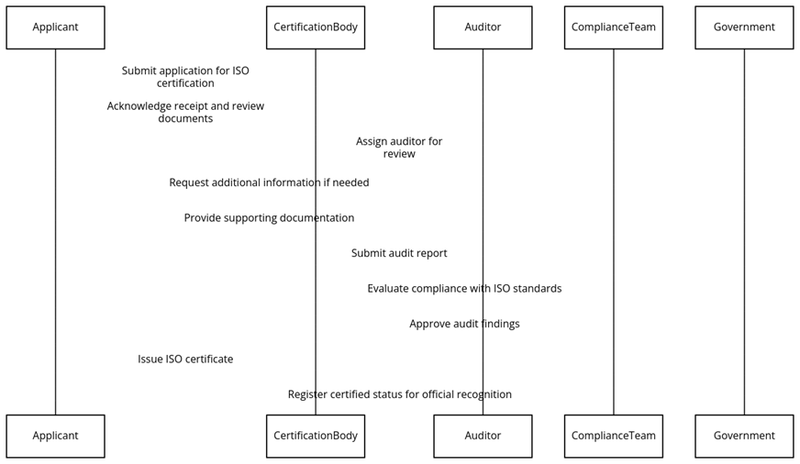ISO Certifications in Bangladesh - Popular Standards, Requirements and Benefits

Introduction
Bangladesh’s economy is driven by garment and textile exports, knitwear and ready-made garments, pharmaceuticals, leather and footwear, food processing, shipbuilding, steel and engineering, logistics, banking and a fast-growing ICT and digital-services layer. As buyer scorecards tighten around quality, safety, environment, energy use, data security and continuity, ISO certification in Bangladesh is becoming a direct filter for access to global brands, large retailers, development projects and financial institutions.
For export-oriented factories, ISO 9001 certification in Bangladesh and ISO certification for garment industry in Bangladesh and textile manufacturers in Bangladesh help show controlled quality rather than informal routines. ISO certification for manufacturing in Bangladesh, food processing, pharmaceuticals and ICT adds structure to risks, monitoring and improvement. This article serves as a practical ISO certification guide in Bangladesh, explaining popular ISO standards, requirements, benefits, cost drivers and timelines so you can see how to get ISO certified in Bangladesh in a realistic way.
Share your scope and sites in Bangladesh with Pacific Certifications and we will map accreditation coverage, recommended audit days and Stage-1 and Stage-2 windows that fit your production seasons, shipment peaks and any integrated ISO 9001, ISO 14001 and ISO 45001 plans, along with ISO 22000 or ISO 27001 where needed.
Economic context and industry overview
Bangladesh continues to show solid growth supported by garments and textiles, expanding pharmaceuticals, food and agro-processing, shipbuilding, light engineering, construction, transport and logistics and a rising ICT and outsourcing sector. Export orders for apparel, home textiles and knitwear remain central to foreign-exchange earnings, while pharmaceuticals, leather, ceramics, jute goods and processed foods keep opening new markets.
At the same time, buyers and regulators pay closer attention to product quality, worker safety, environmental impact, energy use, food safety and data protection. Large brands and retailers look at ISO certification for garment industry in Bangladesh and ISO certification for textile manufacturers in Bangladesh when assessing vendor reliability. Development banks, donors and lenders ask about EHS, social and governance controls at infrastructure and industrial projects. Food and beverage chains want proof of food-safety discipline, while banks and IT service providers face more questions on cyber-risk and continuity.
In this context, popular ISO standards in Bangladesh and clear ISO certification requirements in Bangladesh are no longer just technical topics; they directly influence contracts, pricing power and which factories and service providers stay on preferred-supplier lists.
Why ISO certifications matter in Bangladesh?
Large buyers, brands, lenders and public bodies want evidence-based systems rather than promises in presentations. ISO certification benefits in Bangladesh include faster movement through vendor onboarding, fewer disruptions and clearer records that support decisions and investigations.
ISO 9001 supports process control, supplier oversight, change control and corrective actions across garment factories, spinning and weaving mills, dyeing and finishing units, steel and engineering works, component plants, logistics operators and service centers, as well as shared-service and digital operations. ISO 14001 certification in Bangladesh supports control of effluent, emissions, waste and resource use at industrial sites. ISO 45001 certification in Bangladesh helps factories, construction projects and logistics yards manage site safety, accident prevention and worker wellbeing.
For food producers and processors, ISO 22000 certification in Bangladesh helps structure HACCP, hygiene and traceability. ISO certification for pharmaceutical companies in Bangladesh often combines ISO 9001 with ISO 13485 certification in Bangladesh for medical-device or related manufacturing. Banks, fintech, BPO and ICT operators increasingly examine ISO 27001 certification in Bangladesh to structure information-security controls and combine it with continuity planning.
Popular ISO standards in Bangladesh
These are the core standards that drive ISO certification for manufacturing in Bangladesh, ISO certification for food processing in Bangladesh and ISO 22000 certification in Bangladesh for agri-food value chains.
Certification process in Bangladesh
The ISO certification process in Bangladesh should start with a clear view of how work actually runs in factories, plants, labs, warehouses, call centers and data rooms. The aim is to make your system auditable without creating a second, paper-only layer. Understanding how to get ISO certified in Bangladesh early avoids late surprises and rushed documentation. Below are the steps to consider:
List products, services, sites, headcount and high-risk processes so the scope is clear and audit time is realistic for single-site or multi-site programs.
Map processes end to end so handoffs, records and responsibilities are visible from raw-material receipt to shipment, customer service and regulator interaction.
Run internal audits that focus on high-risk activities such as cutting, dyeing, chemical handling, cold-chain operations, sterile production, cargo handling and data access.
Record nonconformities, root causes and corrective actions and verify that changes are sustained, not just fixed for a single audit.
Hold management review with KPIs, incidents and complaints, internal-audit results, resource issues, planned changes and decisions with deadlines and owners.
Schedule Stage-1 for readiness checks and Stage-2 for implementation verification, blending on-site and remote sampling where suitable to manage time and audit cost.
Keep permits, licenses, inspection and monitoring reports, calibration certificates, supplier approvals, training records and contract or buyer-code commitments organized for quick verification.
This structured ISO certification process in Bangladesh gives management a step-by-step ISO certification guide in Bangladesh that links audits to real operations.
What are the requirements of ISO certifications in Bangladesh?
ISO certification requirements in Bangladesh should mirror actual work in cutting, sewing, finishing and packing lines, effluent plants and boilers, food-processing halls, pharma clean-rooms, shipyards, construction sites, logistics hubs, call centers and data rooms. Below are the key requirements:

Scope aligned to products or services, processes and sites, including multi-site programs where group policies and controls span several factories or offices.
Controlled documents and records that match what staff really do, with clear version control, access rules and change history that certified ISO auditors in Bangladesh can follow during sampling.
Risk assessments and operational controls for real hazards such as needle and machine-safety, fire and building safety, chemical and effluent handling, noise and dust, food contamination, cold-chain breaks, cyber threats, privacy, fraud, energy use and change management.
Competence matrices and training records for machine operators, helpers, supervisors, QA and QC staff, lab technicians, warehouse teams, drivers, engineers, electricians, HSE, IT, security and managers whose actions affect quality, safety, environment, food safety or information security.
Standard-specific artifacts such as HACCP plans and CCP logs for ISO 22000, aspect–impact registers and objectives for ISO 14001, hazard registers and permit-to-work records for ISO 45001, energy review and performance indicators for ISO 50001 and risk treatment and Statement of Applicability for ISO 27001.
A legal and other-requirements register covering labor rules, building and fire rules, environmental and effluent obligations, food and veterinary rules, pharma and medical-device expectations, data and privacy rules and sector-specific guidelines from buyers and regulators.
Internal audits and management reviews carried out as planned, with findings, actions and decisions tracked to closure and backed by evidence.
What are the benefits of ISO certifications in Bangladesh?
ISO certification benefits in Bangladesh should translate into faster buyer decisions, better stability on the floor, fewer disputes and clearer data for contracts and negotiations. Below are the key benefits:
Faster prequalification and higher scores in buyer portals, brand programs, donor and lender due-diligence and public-procurement processes.
Fewer defects, rework, shipment delays and returns across lines, plants, depots and service centers, which supports steadier margins and less scrap.
Clearer roles, responsibilities and skill paths for operators, supervisors, technicians, QA, HSE, IT and managers across shifts and locations.
Traceable data for investigations, recalls, warranty and cargo claims, social and environmental reporting and buyer or regulator reviews.
Stronger supplier and contractor control through audits, KPIs and corrective actions across spinning, knitting, dyeing, embroidery, printing, packaging, transport, cleaning, security and IT services.
Measurable gains in energy use, water use, waste, emissions, uptime and yield where ISO 14001, ISO 45001, ISO 22000 or ISO 50001 are applied.
Stronger signals of reliability for brands, retailers, importers and regional buyers who compare ISO certification in Bangladesh across factories and service providers.
Ready-made garments, textiles and related supply chains are driving strong demand for ISO 9001 certification in Bangladesh and integrated ISO 9001, ISO 14001 and ISO 45001 systems, often as part of brand and buyer-code expectations. Growing pharma and healthcare exports continue to push interest in ISO 9001 and ISO 13485 certification in Bangladesh, as well as lab-related standards where testing is in scope.
Food and agro-processing, fisheries and cold-chain operations are looking more closely at ISO 22000 certification in Bangladesh to protect access to overseas markets. Banks, fintech and IT-enabled services are exploring ISO 27001 certification in Bangladesh and continuity frameworks as digital channels expand. Across sectors, organizations seek affordable ISO certification services in Bangladesh, professional ISO consultants in Bangladesh for implementation and expert ISO certification support in Bangladesh from accredited certification bodies.
Challenges faced in Bangladesh
Local conditions and capacity gaps can slow ISO work if not managed early. Common challenges include:
Budgeting time and funds for ISO certification cost in Bangladesh while managing seasonal peaks, shipment deadlines and buyer audits.
Treating ISO work as paperwork only, which creates a gap between documented procedures and what people do on lines, in plants or in offices.
Shortage of experienced internal auditors and process owners who can link clauses to real risks in factories, shipyards, labs, logistics or IT environments.
Gaps in document control, internal audits, corrective-action discipline and record-keeping across multi-site, multi-vendor and contractor-heavy operations.
Confusion between professional ISO consultants in Bangladesh who help implement systems and the best ISO certification bodies in Bangladesh that perform independent audits and issue certificates.
What is the cost of certification in Bangladesh?
ISO certification cost in Bangladesh is confirmed after scoping and depends on headcount and risk level, the number and spread of sites, your standards set, whether the program is single-standard or integrated, sampling depth for lines, plants, depots, labs, service centers or offices and the mix between on-site and remote audit work.
For many small and mid-sized organizations, including factories, food processors, logistics providers and service companies, ISO certification cost in Bangladesh depends more on employee numbers, process complexity and single-site versus multi-site scope than on revenue alone. Organizations that compare top ISO certification companies in Bangladesh often look for transparent proposals from accredited bodies rather than just the lowest quoted fee.
Your proposal from Pacific Certifications will itemize Stage-1, Stage-2 and surveillance days, explain on-site versus remote activities and highlight any multi-site efficiencies so leadership and finance teams can plan clearly. For a free ISO certification cost estimate for your operations in Bangladesh and a clear outline of audit time, contact [email protected].
What is the timeline for certification in Bangladesh?
Timelines depend on document and record readiness, the speed of closing Stage-1 findings, single-site versus multi-site scope and whether the program is single-standard or integrated. Planning around peak production, shipment windows, maintenance shutdowns, buyer visits and financial year-end also shapes the schedule.
A prepared single site, such as one garment factory, food-processing plant, pharma facility, warehouse, office or data center, can often move from application to decision in one audit cycle once core records and internal audits are in place. Multi-site or integrated programs that combine ISO 9001, ISO 14001 and ISO 45001, or add ISO 22000 or ISO 27001, need more sampling and planning time, especially where several factories or regions are involved.
Important standards often requested by buyers in Bangladesh
How Pacific Certifications can help?
Pacific Certifications provides ABIS-accredited ISO certification and audit services as an independent certification body, not a consultant. We audit and certify ISO management systems for garment and textile factories, knitwear and accessories suppliers, steel and engineering works, shipbuilders, food processors, fisheries and cold-chain operators, pharmaceuticals and medical-device manufacturers, logistics providers, banks, fintech, BPO and ICT organizations across Bangladesh.
Our certified ISO auditors in Bangladesh and regional team work under recognized accreditation and are used to plant-floor, warehouse, site and data-room realities as well as buyer and lender questions. If you are comparing the best ISO certification bodies in Bangladesh or top ISO certification companies in Bangladesh, we can share accreditation details, sample certificates and sector experience so you can make an informed choice.
Request your ISO 9001, ISO 14001, ISO 45001, ISO 22000, ISO 27001 or ISO 13485 audit plan and fee estimate for Bangladesh. We will help you map Stage-1 and Stage-2 timelines and evidence needs for your organization. Contact us at [email protected] or visit www.pacificcert.com.
Accredited training programs
Pacific Certifications provides accredited training programs that help organizations in Bangladesh build internal capability alongside certification:
Lead auditor training: For professionals who want to audit ISO 9001, ISO 14001, ISO 45001, ISO 22000, ISO 27001 or ISO 22301 systems in factories, plants, logistics, banks, fintech, BPO and ICT services.
Lead implementer training: For personnel who design, implement or improve ISO management systems in garment and textile lines, food plants, pharma facilities, logistics hubs, offices and digital platforms.
These programs run online or on-site, depending on client needs, under ISO/IEC 17024 for personnel certification and can complement work with professional ISO consultants in Bangladesh where organizations choose to use them.
Contact Us
If you need support with ISO certifications in Bangladesh, contact us at [email protected].
Read More at: Blogs by Pacific Certifications

